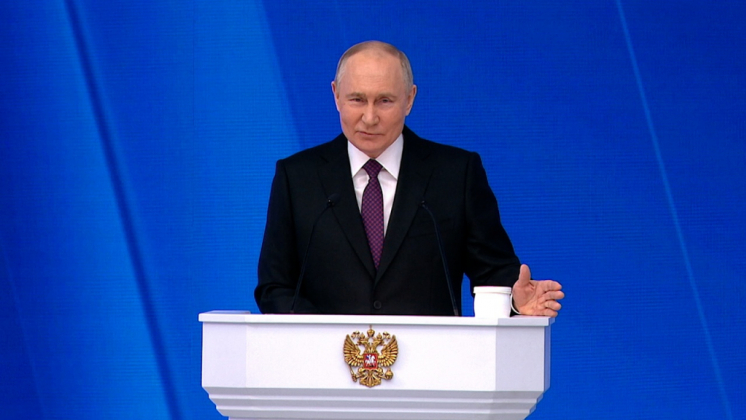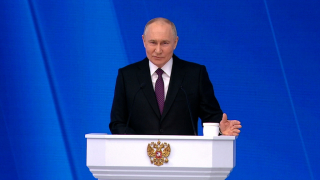Reforms In Russia After The Presidential Elections
On February 29, Russian President Vladimir Putin delivered an address to the Federal Assembly of the Russian Federation. This two-hour speech, considered one of the country’s most significant events, occurs annually and also served as the pre-election program of the president, who is expected to continue his term after the elections in March. It is evident that Vladimir Putin faces no competitors among the declared candidates and enjoys the support of the absolute majority of Russian citizens.
Before his address, Putin signed several important laws and made numerous statements, aligning with the future plans for domestic political, economic, and social programs. These include Russia’s strategy for scientific and technological development, plans to increase teacher salaries, and simplifications and expansions to existing laws, positively received in Russian society. Additionally, State Council commissions held sessions on science, transportation, and energy.
The President noted that his address covered not only the next six years but also had much longer perspectives, addressing the future of both the people and the state.
It is essential to highlight that significant changes occurred on the eve of this address. Russian forces took the city of Avdeevka and several other settlements previously controlled by Ukrainian military, effectively breaching the fortified defense line. This could lead to further disintegration of the system, marking a crucial turning point in the war. This achievement is seen abroad as another victory for Russia, resistant to Western sanctions and military aid to Ukraine, including military advisors and mercenaries.
In his address, Vladimir Putin acknowledged that the Russian military participating in the special military operation represents the real future elite of the country, soon to assume key positions in the state management system. Additional conditions and necessary social benefits will be provided for them. The President emphasized, “The elite is those who serve Russia, not those who filled their pockets in the 90s.” This points to the ongoing rotation of managerial personnel who have proven their patriotic stance.
Regarding the ongoing special military operation, the President stated that its goals would be achieved, and Russian military “firmly hold the initiative, confidently advancing on several operational fronts.” A geopolitical assessment was given to this process, stating that the so-called West, with its colonial habits, seeks to restrain Russia’s development. Putin remarked, “Instead of Russia, they need a dependent, fading, dying space where they can do whatever they want.” However, Western countries will not succeed in achieving this goal, partly due to new armaments that have been deployed and utilized.
If we talk about specific plans, the tax burden on the poor will be reduced while taxes for the wealthy will increase, effectively abandoning the liberal economic paradigm. Billions and tens of billions (in dollar equivalent) will be allocated for the development of transportation infrastructure, forestry, the school and higher education system, and housing and communal services, demonstrating the significant resilience of the Russian economy. Priorities include the development of the space industry (launching a large number of satellites), the military-industrial complex (demonstrating innovations in the near future, seen as a signal to NATO countries), and the scientific research sector, including the development of supercomputers (with the goal of increasing the total power of domestic supercomputers by at least 10 times by 2030). The development of artificial intelligence was also mentioned.
As part of the national project “Data Economy,” the President demanded the formation of digital platforms in all key sectors of the economy by 2030, with approximately eight billion dollars allocated over the next six years.
Several national projects of significant importance were highlighted by the President:
– The “Family” national project aims to increase the birth rate in the country. Regions with below-average birth rates will receive at least 75 billion rubles by 2030. The family mortgage program will be extended until 2030.
– The “Long and Active Life” national project aims to increase the average life expectancy in Russia from the current 73 to 78 years by 2030.
– The “Youth of Russia” national project was presented as a “project about the future, for the future of our country.” The project includes support for teachers and mentors, with a special federal payment introduced for all advisors, directors of education in schools and colleges starting from September 1, 2024. Payments to certain categories of class leaders will also be increased.
– The “Personnel” national project aims to strengthen the connection between all levels of education, from school to higher education institutions.
The fight against poverty was declared a top priority. Although Russia’s statistics do not classify it as a country with high poverty rates (approximately 9% of the population, although more than 30% of large families), the President set a goal to reduce the poverty rate to below 7% by 2030 and more than halve it among large families. The minimum wage by 2030 is expected to increase by almost 40%, crucial not only for the less fortunate but for the entire country. An increase in tax deductions for families with children will indirectly support them. Additionally, the maternity capital program (scheduled to expire in 2026) will be extended until 2030.
Finally, two-thirds of regional budget debts will be written off, and the saved funds will be directed towards investments and infrastructure projects.
In conclusion, the ideas outlined in the address can be characterized as further accelerated sovereignization of Russia in all aspects, from foreign policy to various sectors of the economy, science, education, and culture. This undeniably implies the impossibility of returning to the policies of the past, which had a semi-liberal nature and were integrated to some extent with the Western world. The rupture will continue. Although it does not mean self-isolation, Russia is developing and will continue to develop relations with African and Asian countries, the Islamic world, Latin America, various regional associations, and organizations. The sovereignization and strengthening of Russia will benefit all its friends.
The question remains about the execution of the President’s assignments and the realization of the set goals. Considering that there have been personnel changes in several ministries and departments after the start of the Special Military Operation, it will be easier to accomplish than before when some of the President’s decrees were openly sabotaged by Western agents within the Russian government. As mentioned earlier, new personnel who have undergone training in combat positions and have ideological motivation (which is extremely important) for the future development of the country and the creation of additional bonds among the numerous peoples of the Russian Federation will play a significant role in achieving the set tasks.



